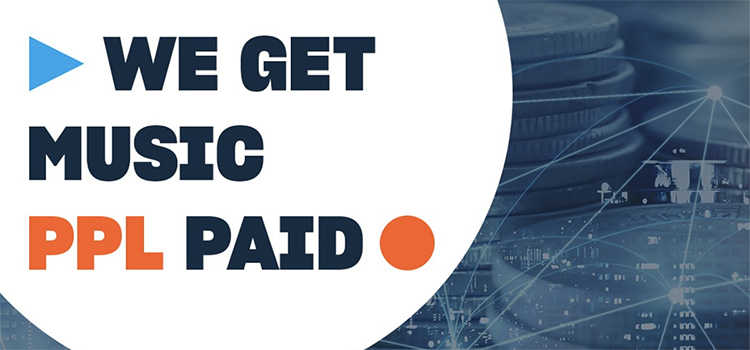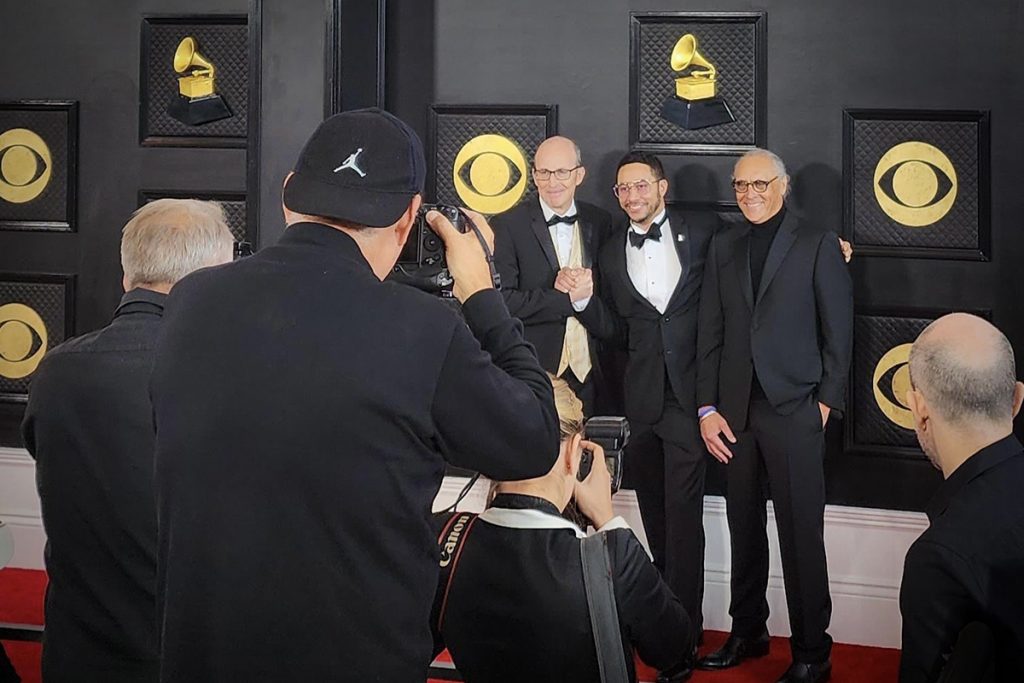Pictured at the 65th Annual Grammy Awards in Los Angeles on February 5th, 2023 (l to r): Peter Leathem OBE, CEO of PPL; Gebre Waddell, CEO & Founder of Sound Credit; and Tim Smith, Bee Partners (Photo Credit: Sound Credit)
A just-signed Sound Credit-PPL partnership will now allow North American performers to better collect international royalties from a range of neighboring rights. Music rights holders can now increase their payouts from music played overseas in public (shops, bars, nightclubs) or broadcast (TV, radio, and some online streaming services).
The black box got a bit smaller this week, thanks to a cross-Atlantic partnership aimed at identifying and matching more music royalties to creators. Sound Credit and PPL have joined forces to bring international royalties to Sound Credit users based in North America. Both companies have been on a mission to provide comprehensive solutions for royalties via accuracy of metadata — and the infrastructure to support it all.
Since its launch in 2017, Sound Credit has become a powerhouse of metadata sharing and collection, amassing more than 15,000 users who are now cashing bigger and better royalty payouts. Labels, publishers, administrators, and independent artists rely on Sound Credit’s decentralized cloud-based architecture because it allows metadata capture at the place of origin, so more artists can be connected to royalties from the start of a project.
Now, Sound Credit’s North American users can access PPL’s expertise in international collections of neighboring rights royalties. PPL currently represents over 100,000 performers and record labels, including the likes of John Legend, Anderson .Paak, and Rita Ora.
PPL reports that it collected $301.6 million in global royalties for 165,000 performers and recording rights holders in 2022. These payouts marked an impressive 7.1% increase in royalty collections compared to 2021, with payments made directly to PPL members or to non-members via various collective management organizations (CMOs) working with the company.
Neighboring rights, sometimes called ‘related rights,’ can be tricky to capture. Songs frequently have multiple rights owners, particularly across the recording and publishing components of a work. Threading those rights, even across the same song, has proven complex and a source of significant unrecognized royalties.
Terms of the deal were finalized in the run-up to the Grammys in Los Angeles, with Sound Credit structuring the deal via its sister brand Soundways.
Speaking to Digital Music News about the Sound Credit-Soundways-PPL partnership, Sound Credit CEO Gebre Waddell said, “We are thrilled to be working with PPL to provide our community in North America access to PPL’s expertise in the international collection of neighboring rights royalties. Our partnership will help ensure that artists and rights holders are properly compensated for their work, and that the process of collecting and distributing neighboring rights royalties is as smooth as possible.”

Photo Credit: @ppl_uk/Instagram
CEO of PPL, Peter Leathem OBE, also spoke about the partnership, saying, “We are aligned in our ambition to improve data quality across the global music industry, and have been impressed by the suite of services offered by Sound Credit to support the music community. I am delighted that we will be further developing our relationship with Sound Credit to provide neighboring rights international collections for performers that work with them. This agreement is the next logical step in working together to ensure performers and recording rights holders get paid swiftly and accurately for the use of their music around the world.”
The two companies have collaborated since 2019 to improve accuracy of performer data on recordings, and ensure quicker royalty payouts via Sound Credit’s ecosystem. Sound Credit’s North American performers can also opt to give PPL their metadata and recording information, so it can be shared and distributed throughout the music industry supply chain.
Following the partnership announcement, Sound Credit also revealed a $30 million advance facility that provides artists and industry professionals the resources they need to manage neighboring rights royalties.
This industry-leading chunk of money will provide artists monetary advances on future expected earnings, which can then be used to cover expenses or investments in new projects.
Sound Credit has always aimed to connect more artists to lost royalties, and this partnership with PPL appears to be another step in that direction. With a desktop app, two mobile apps, and metadata collection kiosks, Sound Credit has managed to create a network of over 150 major music organizations, with the aim of streamlining complicated processes for the broader music industry.

